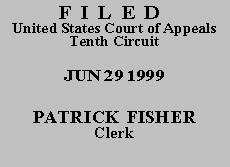

| DARREN MALEKZADEH,
Plaintiff-Appellant, v. HEIDEMAN LAW GROUP PC; RICHARD D. HEIDEMAN; MARIA NICOLINI; THE BONNER SMITH LAW OFFICE, Defendants-Appellees. |
|
Plaintiff Darren Malekzadeh, appearing pro se, appeals from the district court's Fed. R. Civ. P. 12(b)(6) dismissal of his complaint against defendants alleging claims of malpractice, breach of contract, discrimination, conspiracy to discriminate, and RICO violations. We have jurisdiction under 28 U.S.C. § 1291 and we affirm.
We review de novo an order dismissing a complaint for failure to state a claim for relief under Rule 12(b)(6) using the same standard applied by the district court. See Ordinance 59 Ass'n v. United States Dep't of Interior Secretary, 163 F.3d 1150, 1152 (10th Cir. 1998). Plaintiff's pro se pleadings must be construed liberally and held to a less stringent standard than formal pleadings drafted by lawyers. See Haines v. Kerner, 404 U.S. 519, 520-21 (1972). This means that if the court can reasonably read the pleadings to state a valid claim on which the plaintiff could prevail, it should do so despite the plaintiff's failure to cite proper legal theories or unfamiliarity with pleading requirements. See Hall v. Bellmon, 935 F.2d 1106, 1110 (10th Cir. 1991).
However, it is not the proper function of the court to assume the role of advocate for a pro se litigant. See id. "The broad reading of the plaintiff's complaint does not relieve the plaintiff of the burden of alleging sufficient facts on which a recognized legal claim could be based." Id. Conclusory allegations without supporting factual averments are insufficient to state a claim on which relief can be based. See id. (citing Dunn v. White, 880 F.2d 1188, 1197 (10th Cir. 1989)). Thus, in analyzing the sufficiency of the plaintiff's complaint the court need accept as true only the well-pleaded facts, as distinguished from conclusory allegations, and view those facts in the light most favorable to the nonmoving party. See Maher v. Durango Metals, Inc., 144 F.3d 1302, 1304 (10th Cir. 1998). We have reviewed the pleadings in this case with these standards in mind.
After a thorough review of the record, we agree with the district court's resolution of plaintiff's arguments and agree that plaintiff has failed to state any legally cognizable claims against defendants. Accordingly, we affirm for substantially the reasons expressed by the district court in its orders of October 14, 1998, October 29, 1998 and November 12, 1998.
The judgment of the United States District Court for the Western District of Oklahoma is AFFIRMED. All of the pending motions are DENIED. The mandate shall issue forthwith.
Entered for the Court
Senior District Judge
*. This order and judgment is not binding precedent, except under the doctrines of law of the case, res judicata, and collateral estoppel. The court generally disfavors the citation of orders and judgments; nevertheless, an order and judgment may be cited under the terms and conditions of 10th Cir. R. 36.3.
**. Honorable Wesley E. Brown, Senior District Judge, United States District Court for the District of Kansas, sitting by designation.